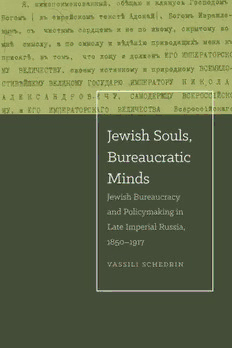
Jewish Souls, Bureaucratic Minds: Jewish Bureaucracy and Policymaking in Late Imperial Russia, 1850-1917 PDF
Preview Jewish Souls, Bureaucratic Minds: Jewish Bureaucracy and Policymaking in Late Imperial Russia, 1850-1917
Jewish Souls, Bureaucratic Minds Jewish Souls, Bureaucratic Minds - Jewish Bureaucracy and Policymaking in Late Imperial Russia, 1850–1917 VASSILI SCHEDRIN Wayne State University Press Detroit © 2016 by Wayne State University Press, Detroit, Michigan 48201. All rights reserved. No part of this book may be reproduced without formal permission. Manufactured in the United States of America. 20 19 18 17 16 5 4 3 2 1 ISBN 978-0-8143-4042-4 (cloth); ISBN 978-0-8143-4043-1 (ebook) Library of Congress Cataloging Number: 2016954100 Typeset by Keata Brewer, E.T. Lowe Publishing Composed in Adobe Caslon Pro Wayne State University Press Leonard N. Simons Building 4809 Woodward Avenue Detroit, Michigan 48201-1309 Visit us online at wsupress.wayne.edu For my wife, Elena Karavannykh For my children, Nadya, Vera, Denis, Mikhail, and Timofey In loving memory of my parents, Liudmila Naumkina and Albert Schedrin Contents - Acknowledgments ix Introduction 1 1. Jews and the Grasp of the Empire 17 2. Bureaucratic Jews 45 3. “Without Haste and Without Rest” 85 4. Jews, Law, and Order 127 5. Literature and the Table of Ranks 177 Conclusion 201 Epilogue 207 Appendix 211 Notes 223 Works Cited 267 Index 281 vii Acknowledgments - The research and writing of the dissertation on which this book is based was a life-changing experience for me. As I lived through many chal- lenges, choices, changes, losses and gains in my personal life, I was also living during a great turning point of world history: the end of the Cold War, the fall of the Soviet Union, and the emergence of a new Russia. In the midst of these unprecedented political, social and economic shifts, I was privileged to take part in the effort to reclaim Russia’s forgotten and forbidden past, rediscovering hidden archives and rethinking neglected historical experience. Now that my book is being published, I want to express immense gratitude to my teachers, colleagues, and friends who instructed, challenged, criticized, advised, helped in many ways, and simply believed in me all along. It all started in late 1980s Moscow. I was initiated as a student of his- tory in the uniquely stimulating atmosphere of the Historical Archives Institute (now the Russian State University for the Humanities) headed by the late Iurii Afanas’ev. Leading Russian historians, such as Nataliia Basovskaia, Mikhail Davydov, and the late Aleksandr Stepanskii, taught me the craft of working with archival sources and the art of writing his- tory. At the same time, I was lucky to be the student of world-renowned experts in Jewish studies, Jewish history, literature, and languages from the United States and Israel, including Menachem Ben-Sasson, Robert Chazan, David Fishman, Pesach Fiszman, Samuel Kassow, Dov-Ber Kerler, and David Roskies, while Marek Web of the YIVO Institute for Jewish Research introduced me to the archival collections in Russian Jewish history. My intellectual and professional growth continued overseas in the Near Eastern and Judaic Studies Department at Brandeis University. ix Acknowledgments My teachers at Brandeis and at other universities in the greater Boston area shaped me as a scholar and teacher of Jewish history, fostering my understanding of scholarship and teaching as a calling, not only as a ca- reer. Antony Polonsky was and is much more than a principal academic advisor to me during my years at graduate school. He sets the standard of professionalism and humanity for me, along with my other teachers, including Gregory Freeze, Reuven Kimelman, Benjamin Ravid, Jonathan Sarna, and Ruth Wisse. The writing of my dissertation and the reshaping of it into a book greatly benefited from the criticism and invaluable advice of my men- tors and colleagues, foremost among them ChaeRan Freeze, Yohanan Petrovsky-Shtern, and Steven Zipperstein. I am grateful to many more, including Eugene Avrutin, Valerii Dymshits, Brian Horowits, Viktor Kelner, the late John Klier, Mikhail Krutikov, Benjamin Nathans, Moshe Rosman, and Shaul Stampfer, who kindly read and rigorously com- mented on my writing and generously shared their expertise and insight. I very much appreciate the warm atmosphere and intellectual sup- port that I found at the Center for Jewish Studies at the University of Florida in Gainesville, where I did most of my work on this book. My colleagues and friends, including Norman Goda, Eric Kligerman, Jack Kugelmass, Dragan Kujundzic, and Tamir Sorek, helped make my time in Florida most productive. My current appointment as the Alfred and Isabel Bader Post- Doctoral Fellow in Jewish Studies at Queen’s University has generously afforded me the precious time needed at the final stages of this book project. Two essential contributors to this book are Nataliia Grinchenko of the National Library of Russia, who facilitated my archival and library research in St. Petersburg, and Annette Ezekiel Kogan, my editor. To them I am greatly indebted for the accuracy of facts and the clarity of the argument presented in this book. Kathryn Wildfong of Wayne State University Press made my man- uscript’s preparation, editing, and production a hassle-free and efficient process, from which this book and its author greatly benefited. The Howard Sachar Travel Fellowship and Provost’s Dissertation Expense Award from Brandeis University facilitated my dissertation research and writing. The Research Expense Award for Faculty from x Acknowledgments Franklin and Marshall College provided support for reshaping and ex- panding my PhD dissertation into a book manuscript. My love for my wife, Elena Karavannykh, and my children, Nadya, Vera, Denis, Mikhail, and Timofey, as well as their love, which I feel and appreciate, truly propelled my writing. This love continues to propel my life and work. I dedicate this book to my loved ones. xi
